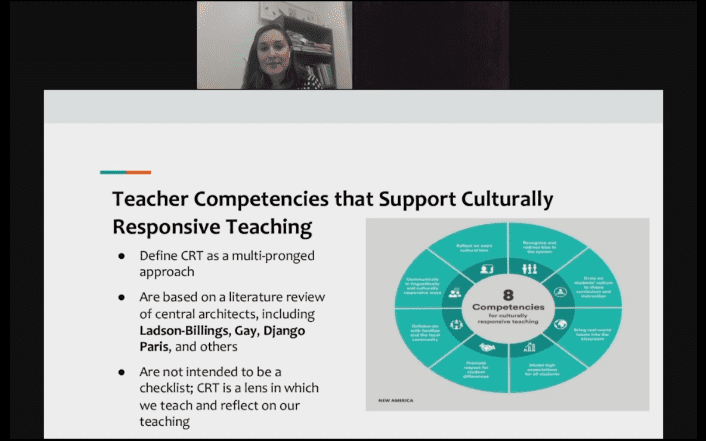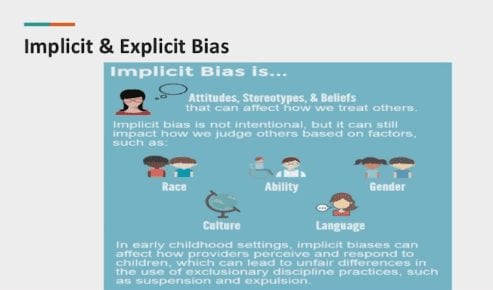Strategies for Culturally Responsive Teaching
A critical topic for schools, communities, and most importantly, our students, is what teachers do in the classroom to nurture ALL students, create a sense of belonging, and keep educational standards high. Only then can students, especially immigrant students and students of color, meet their potential and succeed in school and beyond. During a recent edWebinar, the presenters underscored that when schools make generalizations about particular student populations and their behavior, they strip them of their individuality, and these students become “invisible.”
You Can’t Look Away
Racial discrimination can lead to trauma responses such as feelings of intense fear, anxiety, and helplessness in students. Studies show that when black adolescents feel their teachers lack respect for their background, it can harm their academic outcomes. To create a classroom environment that mitigates threats to student identity, it is critical for teachers and school leaders to implement culturally responsive approaches. It is important to “establish trust through demanding and supportive relationships, foster hopeful narratives about belonging in the setting and use child-centered teaching techniques.”
A Lens
Culturally Responsive Teaching (CRT), a multi-pronged approach to teacher competencies, is not intended as a checklist but as a lens in which we teach and reflect on our teachings. The CRT competencies defined by the presenters include reflecting on our cultural lens and potential biases in that lens. We not only have to understand that we can have personal biases, but that there are biases ingrained in the system. When culturally responsive teachers draw on students’ culture to shape curricula and instruction in their classroom, they bring real-world issues into the classroom, particularly issues that students are experiencing, grappling with, in the day today, and their communities. A common misconception of culturally responsive teaching is that this is a feel-good approach. But in fact, one of CRT’s most significant pillars is the promotion of academic achievement that results in students achieving at high levels of academics. Other competencies critical to culturally responsive teaching are encouraging respect for student differences, collaboration with families in the local community, and communication in linguistically and culturally responsive ways.
The presenters assert that educators and school leaders regularly and consistently be intentional about the work that they are doing with our students. Only then can we ensure that we are taking the time to see students as human beings and not just vessels of the content that we are trying to pour into them.
This edWeb broadcast was sponsored by Digital Promise.
This article was modified and published by eSchool News.
About the Presenters
Monica Washington is the manager of Inclusive and Responsive Educational Practices and an instructional coach for BetterLesson, supporting teachers and other instructional coaches across the country as they make positive shifts in instruction and leadership. A decorated educator of 21 years, Monica has received honors and awards from a wide variety of organizations for her leadership, advocacy, and classroom instruction. She is a 2015 Milken Unsung Hero Fellow and a 2015 NEA Foundation Global Fellow. In addition to instructional coaching, Monica supports teachers through workshops, speaking engagements, and blogging for Education Week and Education Post. Her, “4 Things Great Principals Don’t Do,” was the most read and shared Education Week post of 2017. She is passionate about creating equitable and inclusive school environments that celebrate teacher and student voice, and she serves as Leading Educator Ambassador for Equity for the Education Civil Rights Alliance. Additionally, she serves on the Board of Directors for the National Education Association Foundation. Monica is the 2014 Texas Teacher of the Year.
Jenny Muñiz is a senior program associate with the Education Policy program at New America. After serving as a New America Millennial Public Policy Fellow, Jenny joined the PreK–12 team, where she researches and reports on policies and practices related to English learners, culturally responsive education, and educational equity. Before joining New America, she taught second grade in San Antonio, where she was the lead bilingual teacher on her campus.
Kelisa Wing has been an educator for 12 years. She taught eighth grade language arts and reading to military-connected children at Faith Middle School in Fort Benning, Georgia, has been an elementary school assistant principal, and is now a professional development specialist. Kelisa honorably served in the U.S. Army for six years and attained the rank of Staff Sergeant. She is the author of Weeds & Seeds: How to Stay Positive in the Midst of Life’s Storms and Promises and Possibilities: Dismantling the School-to-Prison Pipeline.
She is a 2017 State Teacher of the year, a 2016 Association of Supervision, Curriculum, and Development (ASCD) Emerging Leader, and the 2017 University of Maryland University College (UMUC) Outstanding Alumnus of the Year. She is a member of the Leading Educator Ambassadors for Equity (LEAE) with the Education Civil Rights Alliance (ECRA), a member of the National Network of State Teachers of the Year (NNSTOY), and a member of ASCD. She is also is on the advisory board for Learner Variability Project and Digital Promise. She speaks both nationally and internationally about discipline reform, equity, student engagement, and many other topics. Kelisa holds a bachelor’s degree in English from UMUC, a Master of Arts in secondary education, and an Educational Specialist degree with a concentration in curriculum, instruction, and educational leadership from the University of Phoenix.
Medha Tare has more than ten years of experience conducting applied research in the learning sciences. She enjoys translating research to non-academic audiences so it can be used by practitioners in the classroom and by the learners themselves. She is currently the senior research scientist for the Learner Variability Project, leading the synthesis of research on learners’ strengths and challenges and evaluating the impact of the project’s work on learners across the country. She holds a B.A. from Rutgers University and a Ph.D. in psychology from the University of Michigan.
About the Host
Barbara Pape is the communications director for the Learner Variability Project at Digital Promise Global (DPG). She has 20 years’ experience in strategic communications, writing, and policy analysis, primarily in education. Previously, she served as Executive Producer of the award-winning Teaching & Learning conference, sponsored by the National Board for Professional Teaching Standards, where she developed content and oversaw outreach and communications. As a writer, she has written for numerous publications, including Harvard University, the National Education Goals Panel (U.S. Department of Education) and Parents magazine. Barbara also served as editor and publisher of the first electronically delivered education newsletter, the Daily Report Card. She earned an EdM at Harvard University’s Graduate School of Education and launched her career as a middle school language arts teacher.
Join the Community
Personalize Learning for Learner Variability is a free professional learning community on edWeb.net that brings together researchers, educators, entrepreneurs and product developers to share the latest research findings, best practices, and success stories that are shaping the development of research-based programs and products to address the growth of learning variability in today’s schools.






Comments are closed.